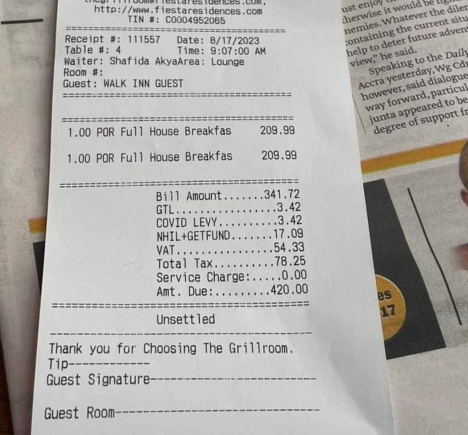
A levy is a tax: belaboring an obvious point
The Ghana Revenue Authority (GRA) treats levies (like the Covid-19 levy) and the value-added tax (VAT) differently because the levies are imposed on the value of consumption but the VAT is imposed on the levies-inclusive amount of a consumer's expenditure. To the GRA, it appears that a levy is not a tax. The GRA claims that "The base for charging VAT is the value of the supply (Goods or services) including the chargeable levies ... " (see reference below). This is wrong!
The Covid-19 levy, tourism levy, Ghana education trust fund levy (GetFund levy), and national health insurance levy (NHIL) are examples of earmarked taxes. According to Ozer et al. (2020), "Earmarking means taking all or a portion of total revenue from a tax or group of taxes and setting it aside or “protecting” it for a designated expenditure purpose." Nobel laureate James Buchanan (1963) defined earmarking "as the practice of designating or dedicating specific revenues to the financing of specific public services. It is discussed under such headings as special funds, segregated accounts, segregated budgets, dedicated revenues."
The NHIL is a 2.5% consumption tax that is earmarked for healthcare expenditures; the GetFund levy is a 2.5% consumption tax that is earmarked for expenditures on education; and the tourism levy is a 1% consumption tax that is earmarked for the development of tourism. The tourism levy is imposed on the consumption of services provided by hotels, restaurants and catering centres, tourist sites, tour operators, etc. And the Covid-19 health recovery levy 2021 (Act 1068) is "An Act to impose a special levy known as the Covid-19 health recovery levy on the supply of goods and services and imports to raise revenue for Covid-19 expenditures and to provide for related matters." In contrast, the VAT is a 15% non-earmarked consumption tax (i.e., it can be spent on any government activity). Levies are taxes. That is why levies require parliamentary approval.
The Covid-19 levy, tourism levy, GetFund levy, NHIL, and VAT are all consumption taxes and they should be imposed on the value of consumption (the tax base for consumption). The value of consumption is NOT the levy-inclusive or tax-inclusive amount of a consumer's expenditure. To reiterate, the GRA's claim that "The base for charging VAT is the value of the supply (Goods or services) including the chargeable levies ... " is wrong!
The main differences between the levies and the VAT are that the levies are earmarked taxes while the VAT is a non-earmarked tax and there is no input tax refund (to producers) associated with the levies while there is an input tax refund (to producers) under the VAT. According to the GRA, "The NHIL, GETFund Levy and COVID-19 HRL cannot be deducted as input VAT." (see reference below).
A levy is a tax.
J. Atsu Amegashie
August 20, 2023
References
Amegashie, J.A. (2023). Ghana: still calculating consumption tax incorrectly. Graphic Online, August 17, 2023 Graphic Online - Graphic.com.gh (https://www.graphic.com.gh/features/opinion/ghana-still-calculating-consumption-tax-incorrectly.html) .
Buchanan, J.M. (1963). The economics of earmarked taxes. Journal of Political Economy 71: 457-469.
Ghana Revenue Authority, The VAT Standard. (https://gra.gov.gh/domestic-tax/tax-types/vat-standard/#:~:text=services%20into%20Ghana.-,The%20levy%20is%20chargeable%20at%20a%20rate%20of%201%25%20calculated,goods%20and%20services%20into%20Ghana .).
Ozer C, Bloom D, Martinez Valle A, Banzon E. Mandeville K, Paul J, Blecher E. Sparkes S, Chhabra S. (2020). Health earmarks and health taxes: What do we know? Health Nutrition and Population Global Practice. Knowledge Brief. Co-produced with the JLN. World Bank: Washington DC, December 2020.
